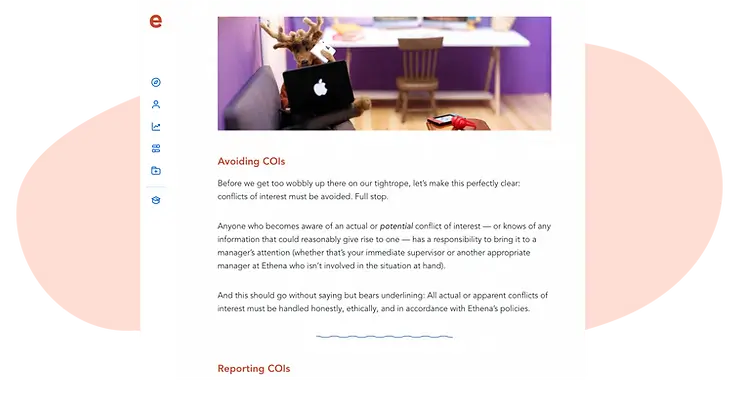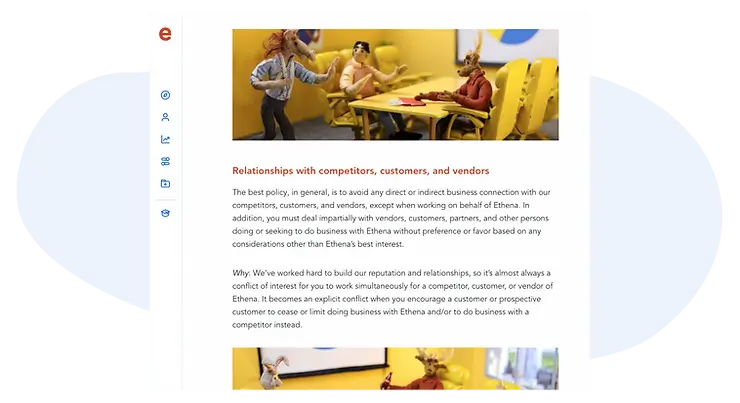Picture it: You’re a mid-level manager and, all of a sudden, you get a phone call. Your spouse has been laid off. You’re shocked and, understandably, want to help. When you reflect on the positions you’re hiring for in your own company, you realize that your spouse may fit nicely into a role that you’re hiring for that you would directly manage. But this is a conflict of interest — your spouse, and your household, would be directly gaining from your position of power.
This situation may sound far-fetched, but in reality, people find themselves in the crosshairs of these gray areas all the time. Swap out that spouse and rotate in a child, cousin, friend, business partner, you name it — they are all, technically, conflicts of interest.
What is a conflict of interest?
Here’s how we define conflict of interest (COI) in our Code of Conduct training: A conflict of interest occurs when your personal interests or activities interfere (or appear to interfere) with the interests of the company as a whole. If you’re in a position where multiple motivations collide, you’re going to have less capacity to have your workplace’s best interests at heart. Common umbrellas for conflicts include:
- Personal. This is when a conflict of interest occurs that can directly benefit you.
- Indirect. This is when a conflict doesn’t benefit you directly, but benefits someone close to you, like a family member or friend.
- Financial. This conflict of interest occurs when you have a financial motivation for a workplace decision to fall one way instead of another.
- A mix. Conflicts of interest can get sticky, so it’s not uncommon to encounter a situation where a conflict has a mix of these different qualities.
If you’re still scratching your head, take this idea out of a work context and think about conflicts in your personal life. What do you do if your sibling, for example, gets into an argument with your partner or spouse? You have loyalty to both people, so you don’t know whose side to take. Imagine this feeling taking root in your workplace.

What are common types of conflicts in the workplace?
When it comes to conflicts of interest, it’s a big tent with a lot of performers under it. Though there are areas of overlap, distinct acts that are conflicts of interest include:
Nepotism
Nepotism is when a person in a position of power grants opportunities to one individual over another for purely personal reasons. It can often be seen in:
- Hiring trends. This happens when a manager hires a friend, family member, or colleague who is unqualified for the role they’ve been hired for. Sometimes, that new hire can be so unqualified that they’ve only been hired because of a personal relationship.
- Romantic relationships. If a manager dates someone that they supervise, it’s more than likely that the subordinate will be in line to receive preferential treatment over other colleagues.
- Ignoring complaints. This happens when a manager turns a blind eye toward complaints about an employee that they personally like or are friends with. Complaints of misconduct cannot be fairly heard or investigated due to that bias.
Financial gain
A conflict of interest based on financial gain can also be wide-ranging and take many shapes, but often the core motivator is money. Common examples are:
- Funneling clients. This conflict of interest occurs when you opt to perform side or contract work for one of your company’s clients to make money for yourself.
- Business relationships. If you own stock in a local business and find that your company is looking for a new vendor in that business’s space, a conflict occurs when you push for the business to get that contract since you’re financially benefiting from.
Self-dealing
Self-dealing encompasses both insider trading and the failure to act as a corporate fiduciary.
- Corporate fiduciaries. Say you’re a leader in a company where you’re making financial decisions on the behalf of the organization and its shareholders, otherwise known as a corporate fiduciary. If you make a decision that negatively impacts the company but enriches you somehow, that’s a conflict of interest. Why? Because corporate fiduciaries are obligated to put the health of shareholders and the company itself first — not their own personal gain.
- Insider trading. Self-dealing is when you receive confidential word of company updates and choose to buy or sell company stock to profit from that private knowledge. Any employee with access to inside information could run into this type of conflict.
Are conflicts of interest illegal?
Conflicts of interest are expressly illegal for public service employees and elected officials like judges, legislators, and members of state and federal governments. Since their role is intended to protect the interests of the public and not themselves, they have some of the strictest guidelines on conflicts of interest.
Federal conflict of interest regulations that guide public sector employees focus primarily on self-dealing and financial gain. One existing federal standard is that if a federal employee has $10,000 or 5% of stock in a public or private company that conflicts with their job — for example, a competitor — they must disclose it. Since this standard is in federal law, state governments and the private sector use this figure as a touchstone for their own policies.
In the private sector, most of the time conflicts of interest are not explicitly illegal. Private companies and state governments have to develop their own sets of guidelines internally. Because of that, it is incredibly common for conflicts of interest to be handled within private companies through reprimands instead of externally with legal action.

Strategies to manage conflicts
Since conflicts of interest are often not illegal for private employees, there are established ways to manage them. Those strategies include:
- Reporting processes. It’s common for company policies to establish a reporting process so that employees have a clear way to disclose potential conflicts of interest. This should be included in your Code of Conduct training, something that Ethena can configure easily for many companies.
- Explicit policy. Some companies opt to cut conflicts at the root through an organization-wide policy that, if broken, would result in formal reprimands or termination. For example, some common policies include bans on dating in the workplace or hiring new employees that are related to existing employees.
- Non-compete agreements. Non-compete agreements usually prohibit you from funneling clients away from your company for a fixed amount of time — even after your employment ends. It can also prevent you from working for a direct competitor for a specific amount of time.
- Remove a conflict. A common way to manage conflicts of interest is to recuse yourself from decisions that might introduce a conflict. For example, let’s say you’re in a position of power in a company and tasked with finding a new vendor for your company’s accounting software. Your brother just so happens to be a stakeholder in an applicable software start-up. To remove the potential for a conflict, it’s a good idea to alert your supervisor on the conflict of interest and have the task of finding a new vendor transferred to someone else since you cannot make an unbiased decision.
- Retrain your employees often. Sending them training nudges (aka microlessons) at whatever frequency you’d like can keep your conflict of interest and Code of Conduct policies top of mind for your employees. If your training can’t be sent out in this manner – why not? Ethena was founded on the principles of making compliance trainings that actually changed workplace behaviors.
Final thoughts
Conflicts of interest can be professional, personal, or even fall across those lines into gray areas. If left unchecked, they could even progress into larger financial crimes such as money laundering or insider trading.
They’re messy. They’re human. You may not even recognize when certain actions you take are conflicts of interest. “Companies are still dealing with people who are abusing their position," said former AirBnB CEO Rob Chesnut, in an interview with Ethena, "or not thinking closely enough about conflicts of interest."
Even perceived conflicts of interest can undermine a person’s professional integrity. Their colleagues, clients, vendors, and the public at large can’t trust that they are acting in an honest way if there is an impression that they are personally gaining from their position. Prevent this from ever happening and nip it in the bud. Train your workplace the right way, the first time, with Ethena’s Code of Conduct training. Let’s talk to see if we’re a good fit for each other.
Not ready to chat? Request a sample training of another course to see us in action. We’re a modern compliance training platform that delivers current, cringe-free content that employees actually enjoy.










